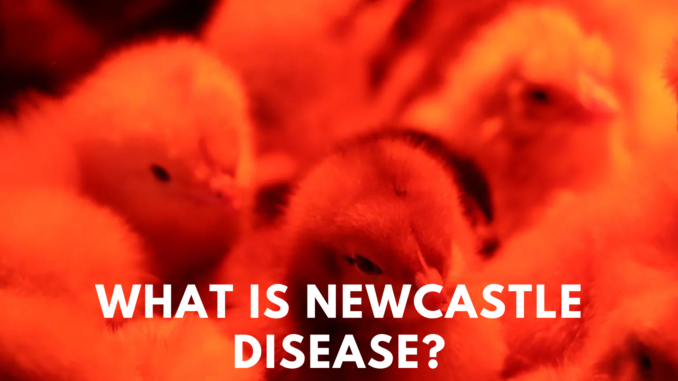
Newcastle Disease (ND) might sound like the name of a quaint village, but it’s actually a serious concern in the world of poultry. This viral infection affects birds and can have severe consequences, not just for the feathered residents but for the poultry industry as a whole. Let’s dive into what makes Newcastle Disease such a critical issue.
Newcastle Disease was first identified in 1926 in Newcastle, England, and has since become a global concern. Initially described as a highly contagious and often fatal disease in poultry, Newcastle Disease has seen various outbreaks over the decades, each underscoring the need for robust preventive measures and research.
Causes of Newcastle Disease
So, what’s behind this ailment? Newcastle Disease is caused by the Avian Paramyxovirus Type 1 (APMV-1), which belongs to the Paramyxoviridae family. This virus is notorious for its ability to spread rapidly among birds through airborne droplets, contaminated feed, water, or direct contact with infected birds.
Symptoms and Clinical Signs
Symptoms of Newcastle Disease can vary widely, from mild respiratory issues to severe neurological signs. In acute cases, birds might experience respiratory distress, diarrhea, and even sudden death. Mild forms can present as a drop in egg production or slight respiratory symptoms. Recognizing these signs early is crucial for managing and controlling outbreaks.
Diagnosing Newcastle Disease involves a mix of laboratory and field techniques. Laboratory tests, such as virus isolation and serological assays, are used to confirm the presence of the virus. Field diagnosis might involve observing clinical signs and conducting preliminary tests to identify the infection quickly.
Prevention Strategies
Preventing Newcastle Disease primarily revolves around vaccination and biosecurity. Vaccines are available and effective in protecting birds from various strains of the virus. Additionally, maintaining strict biosecurity measures—like isolating new birds, sanitizing equipment, and controlling access to poultry areas—helps prevent the virus from spreading.
Treatment Options
While there’s no specific antiviral treatment for Newcastle Disease, supportive care can help affected birds recover. This might include providing a clean environment, proper nutrition, and sometimes, antibiotics to prevent secondary infections. The focus remains on preventing outbreaks rather than treating them once they occur.
Impact on Poultry Industry
The economic impact of Newcastle Disease is substantial. Outbreaks can lead to massive losses due to increased mortality, decreased egg production, and costs associated with control measures. For poultry producers, managing these outbreaks and preventing future ones is a critical component of their business strategy.
Newcastle Disease in Different Regions
The prevalence of Newcastle Disease varies by region. In some areas, the disease is well-controlled through vaccination programs and biosecurity, while in others, it remains a significant problem. Regional control measures and international cooperation are essential for managing the spread of the virus.
Research and Development
Ongoing research is crucial for advancing our understanding of Newcastle Disease. Innovations in vaccine technology, such as more effective and longer-lasting vaccines, are on the horizon. Researchers are also exploring new treatment options and better diagnostic tools to combat this persistent problem.
Case Studies
Looking at specific outbreaks of Newcastle Disease provides valuable lessons. For instance, a major outbreak in Indonesia in the early 2000s highlighted the need for improved vaccination strategies and international collaboration. Each case study offers insights into better management and prevention strategies.
Public Awareness and Education
Raising awareness about Newcastle Disease is vital. Poultry farmers and the general public need to understand the importance of vaccination and biosecurity. Education programs can help spread knowledge about the disease and how to prevent it, contributing to overall better management practices.
Government and Organizational Roles
Various organizations and governments play crucial roles in controlling Newcastle Disease. The World Organisation for Animal Health (OIE) and the Food and Agriculture Organization (FAO) provide guidelines and support for disease management. National governments also enforce regulations to prevent and control outbreaks.
Future Outlook
Looking ahead, the fight against Newcastle Disease continues. Challenges such as emerging strains and the need for more effective vaccines remain. However, with ongoing research and global collaboration, there is hope for better control and eventual eradication of this disease.
Conclusion
Newcastle Disease is more than just a challenge for poultry; it’s a significant concern that affects the entire agricultural sector. Understanding its causes, symptoms, and control measures is crucial for managing this disease. By investing in research, vaccination, and education, we can work towards minimizing its impact and ensuring a healthier future for poultry worldwide.
FAQs
- What is the primary cause of Newcastle Disease?
- Newcastle Disease is caused by the Avian Paramyxovirus Type 1 (APMV-1).
- How is Newcastle Disease transmitted among birds?
- The disease spreads through airborne droplets, contaminated feed, water, and direct contact with infected birds.
- Can Newcastle Disease be treated once a bird is infected?
- There is no specific antiviral treatment, but supportive care can help affected birds recover.
- What are the key prevention strategies for Newcastle Disease?
- Vaccination and strict biosecurity measures are the main strategies to prevent Newcastle Disease.
- How does Newcastle Disease impact the poultry industry?
- It can lead to significant economic losses due to increased mortality, reduced egg production, and control costs.
Leave a Reply